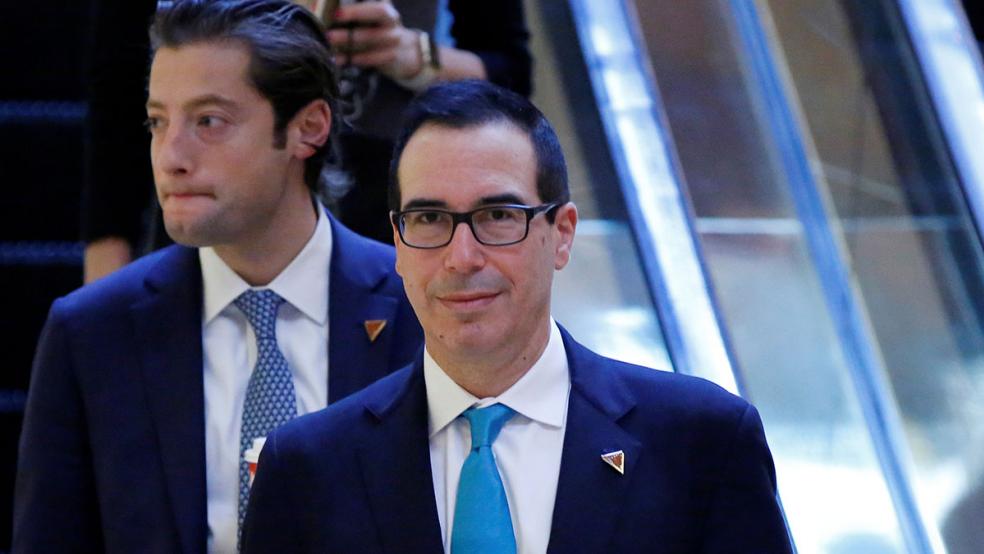The singe-page tax plan put forth by the White House last week makes no mention of taxes on so-called carried interest, income claimed by hedge fund and private equity managers that is taxed at a lower rate than ordinary income.
Related: Winners and Losers from Trump’s New Tax Plan
But on Sunday, Trump chief of staff Reince Priebus said on a morning talk show that carried interest was “on the chopping block.”
That would fulfill a campaign pledge of President Trump to go after hedge fund managers whom he said were getting away with murder.
“The hedge fund guys didn't build this country. These are guys that shift paper around and they get lucky,” he said in August, 2015, on Face the Nation. “They make a fortune. They pay no tax. It's ridiculous, ok?"
You might expect that Priebus’ comment would have heads hanging low at hedge funds, but Reuters reported last Thursday that instead there were “fist bumps” by the carried interest crowd.
Why the enthusiasm?
Because the way many hedge and private-equity funds are structured may make them eligible for the 15 percent tax rate that the Trump plan is proposing for “pass-through” businesses. The capital gains tax rate for carried interest is higher at 20 percent.
Related: US Debt Is Going to Soar Over the Next 30 Years
“If an investment firm qualifies for the pass-through rate, it wouldn’t care about carried interest,” Howard Gleckman, a senior fellow at the Tax Policy Institute, said in an email. “The partners would just pay the 15 percent rate” -- though he cautioned other technical factors could come into play.
Reuters said that while the pass-through rate would benefit small businesses set up as limited liability corporations, it could also give hedge funds an enormous break.
A hedge fund manager who earns $50 million a year and pays anywhere from $10 million to $20 million in taxes depending on the mix of capital gains and ordinary income could wind up with a tax bill of as “little as $7.5 million if the rate were cut to 15 percent,” Reuters said.
For a candidate who derided hedge fund managers as “paper-pushers,” Trump in the end collected millions for his campaign from the $3 trillion industry, and he has peppered his administration with “hedgies.”
Among them are Steve Mnuchin, the first former hedge fund manager to become Treasury Secretary; Commerce Secretary Wilbur Ross, who made his name investing in distressed assets, but also ran hedge funds; and Trump cheerleader and transition team member Anthony Scaramucci, who founded the hedge fund Skybridge Capital.
Related: The Fed, the Reality of Tax Cuts, and Donald Trump
Steve Schwartzman, chairman and CEO of the private-equity firm Blackstone Group, heads Trump’s economic advisory council. One of the president’s longtime confidants is hedge fund billionaire and corporate raider Carl Icahn. John Paulson, the hedge fund billionaire who made a killing on the housing crisis, was an early backer and adviser.
In fact, The New York Times said that according to the financial disclosure statement filed when Trump began his run for president, he had $3 million to $15 million invested in a Paulson hedge fund. In addition, Mnuchin and Paulson were fellow investors in the remains of the failed bank IndyMac, which became OneWest; the revived bank foreclosed on tens of thousands of mortgages and was eventually sold to CIT Group for $3.4 billion.
Some of the biggest beneficiaries may be the hedge fund principals who put their millions behind Republicans in the 2016 elections. Of course, not all of the big donors gave to Republicans. In fact, Democrats raised nearly as much as Republicans from the big-money heavy hitters. But among the 100 top individual contributors in the 2016 election cycle, donors connected to hedge fund and private equity firms gave at least $93 million to the GOP, according to OpenSecrets.org.
Robert Mercer, the co-CEO of the hedge fund Renaissance Capital whose influential daughter Rebekah was on the transition team, is listed as Trump’s top donor by OpenSecrets, with contributions totaling more than $15.5 million.
In the end, Trump may be able to say he made good on his campaign rhetoric about doing away with what some call the carried interest boondoggle. But if hedge fund managers wind up with the pass-through tax rate of 15 percent, those “paper-pushers” will be getting a richer break than ever.





